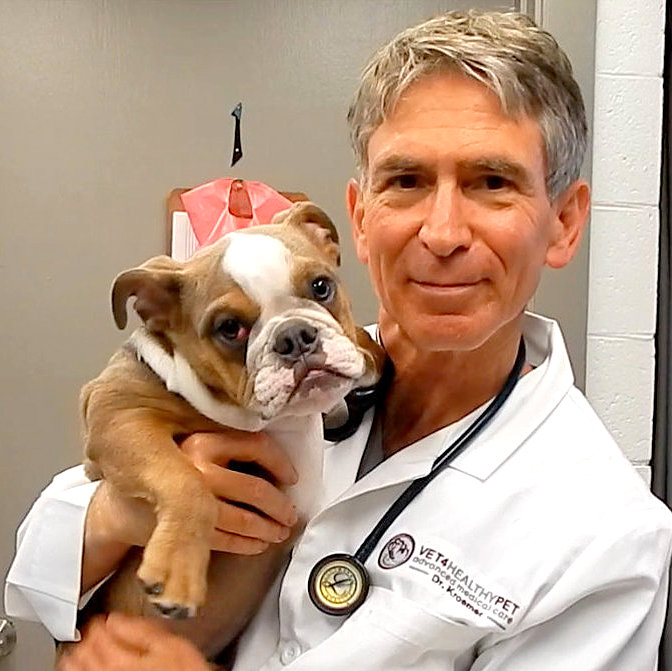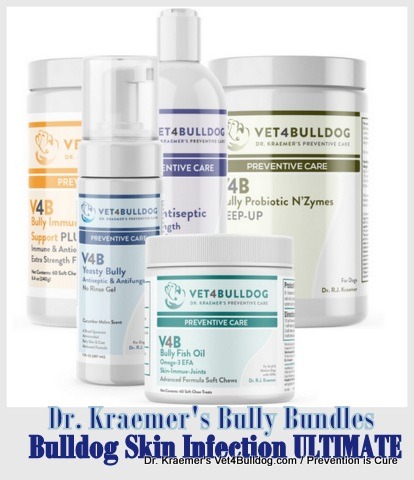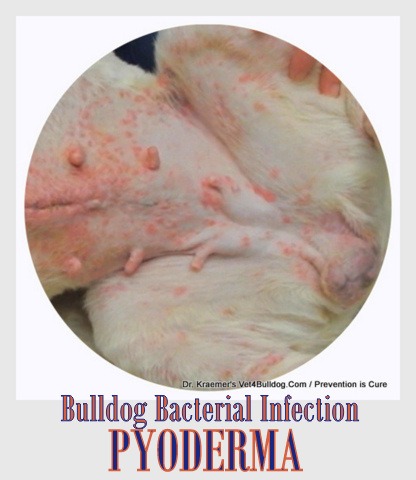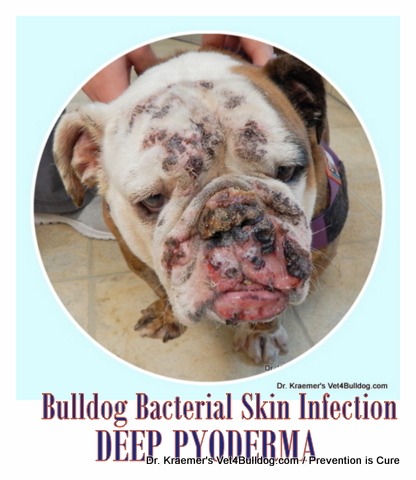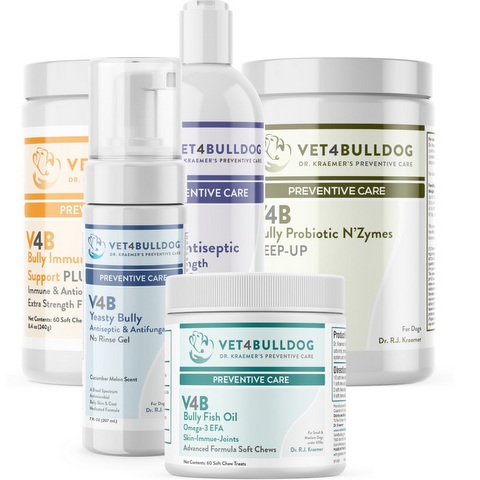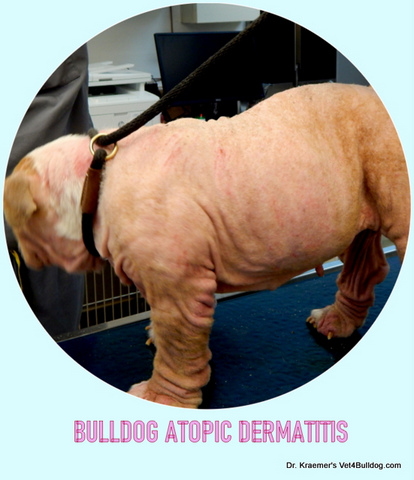Subject: Seeking Guidance for Bella’s Pyoderma & Bacterial Dermatitis 🐾😔 #BulldogHealth #SkinCare
Dr. Kraemer, I’m writing to express my concern about my beloved bulldog, Bella, who seems to be struggling with a bad skin infection. I’ve noticed redness, bumps, and discomfort in her skin, and it’s been quite distressing for both Bella and me. Your guidance means the world to us! 🙏🏼 Thank you for always being there for our furry family members.
Warm regards, The Smith Family & Bella the bully 🐶💖 #BulldogMom #SkinInfection
Pyoderma is derived from the Latin language and stands for bacterial infection of purulent skin (pus).
One of the most commonly recognized bacteria responsible for skin infections is Staphylococcus pseudointermedius.
While these bacteria are typically present as part of the “normal” skin microflora colonization, but an overgrowth or skin barrier injury can lead to infection.
Bulldog Bacteria Skin Infection (Pyoderma) 5 X MUST KNOW
- There are three types: surface (mild/common), superficial (moderate/common), and deep (rare/severe).
- Due to the overuse of antibiotics, we see a higher number of multidrug-resistant bacterial infections.
- Antibiotics are not needed for surface pyoderma and often make the problem worse.
- Bully therapeutics should be used for all skin infections; they are often superior to medication.
- Prevention and care include Dr. Kraemer’s Bulldog Skin Infection Bundles.
Members of this bulldog community prefer prevention over RX
Skin Infections In Bulldogs PYODERMA TYPES:
There are three types of pyoderma: two are common, and the third is rare.
BULLDOG SURFACE PYODERMA
Surface pyoderma, characterized by a bacterial infection of the skin surface, is often referred to as a “hot spot”.”
Typically, this infection is mild and can be effectively treated with nonprescription topical therapeutics.
The most commonly associated bacteria with surface pyoderma is Staphylococcus pseudointermedius.
BULLDOG SUPERFICIAL PYODERMA:
It is a common bacterial infection within the skin, typically ranging from mild to moderate in severity. In some cases, prescription medication may be necessary based on cytology findings.
BULLDOG DEEP PYODERMA:
Deep pyoderma is a rare bacterial infection located beneath the skin. It is typically a more severe form of infection, often necessitating systemic antibacterial treatment.
Bulldogs affected by deep pyoderma can become ill and may require immediate medical attention.
Skin Infections in Bulldogs And French Bulldogs CAUSE:
GENETIC
Bulldogs are prone to allergies and skin diseases.
ALLERGIES:
- Food allergy
- Atopic environmental allergy
- Flea allergy
- Contact allergy
Itching leads to skin injury, and damages the skin’s defensive barrier allowing secondary bacterial infections.
IMMUNE SUPPRESSION:
RX:
- Cortisone: Steroids are immune suppressants.
- Chemotherapy: weakens the immune system and white blood cell count
Hormonal disease:
- Cushing: abnormally high endogenous cortisones.
- Hypothyroid: Low thyroid levels weaken the immune system
- Diabetes
Chronic Disease & Stress
- Parasitic infection: weakens the immune system
- Stress will suppress the immune system
- Poor nutrition
- Other chronic illness
Some pyodermas are unique to bulldogs; the most common ones are:
SKINFOLD MOIST INFECTION DERMATITIS
- Face
- Nose
- Tail
- Vaginal
- Paws
BULLDOG ACNE
- Chin
- Lips
Skin Infections In Bulldog Pyoderma PRESENTATION
- Itching & Scratching
- Redness, puffiness, and inflamed Skin
- Baldness, Alopecia, and Hair Loss
- Oozing, draining tracks
- Pus lesions (Pustules)
- Pain
Bulldog Pyoderma Skin Infections: DIAGNOSIS
- Exam
- Scrape: checking for mites
- Cytology: checking for inflammatory cells, yeast, and bacteria
- Allergy Testing: food trials and blood VARL test
- Fungal Culture
- Blood & Hormonal tests
- Culture & Sensitivity:
Culture is only required for unresolved infections that do not respond to antibiotic treatment.
Examples are:
- MRSP: the common staph bacteria that mutates and is no longer responsive to the common antibiotics.
- Gram-negative bacteria and other less common skin pathogens.
Skin Infection Bulldog Pyoderma PREVENTIVE CARE
- Identifying and managing the underlying immune suppressant disease
- Avoiding immune suppressant drugs
- A balanced, quality diet
- a stress-free, loving environment
- NON-PRESCRIPTION BULLDOG THERAPEUTICS:
- Topical bully Therapeutics
- Bully therapeutic Supplements
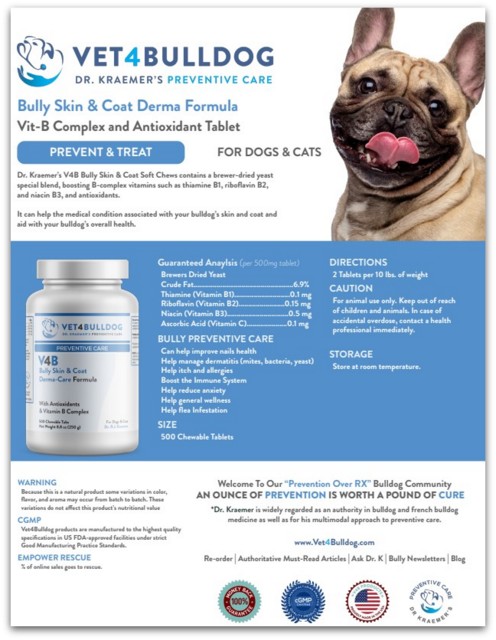
Bulldog Skin Infection: PYODERMA TREATMENT
Treatment depends on the severity and type of the pyoderma
Surface Skin Pyoderma Infection:
Bathing and bully therapeutics are usually all that is required.
BATHING: Bathing helps remove allergens and dead skin and is soothing
MEDICATED ANTISEPTIC SHAMPOO
- V4b Bully Extra Strength Antiseptic Shampoo
- V4B Yeasty Bully Antiseptic Medicated Shampoo
ANTISEPTIC SPRAY AND GELS
- Yeasty Bully Antiseptic No-Rinse Gel
- Hot Spot Bully Antiseptic Spray
IMMUNE & INFLAMMATION
- Bully Fish Oil
- Bully Immune Support
GUT MICROBIOME
- Bully Pre/Probiotics LOAD UP
- Bully Digestive Enzymes Probiotic KEEP UP
CALM & RELAX
- Bully StressLess
- Bully HEMP Calm
WARNING: Antibiotics are not recommended for surface skin infection; they are mostly ineffective and can compound the problem by selecting resistant bacteria and by its negative effect on the gut microbiome (good gut bacteria)
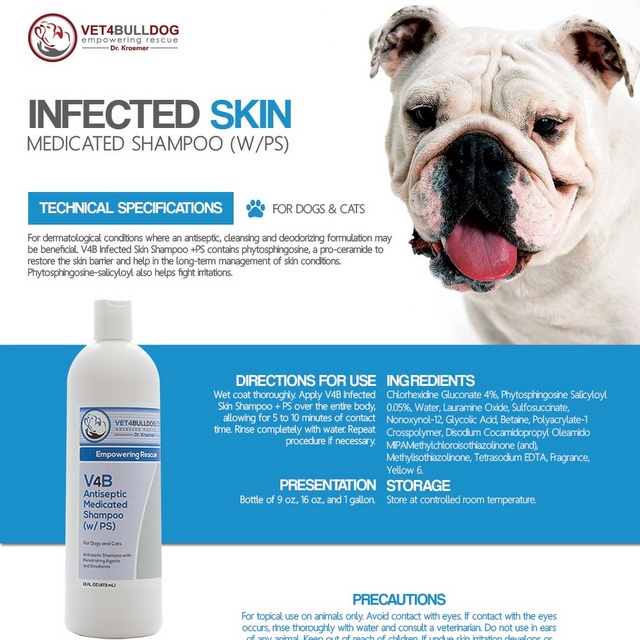
Superficial Pyoderma Skin Infection
Bully therapeutic are combined with antibiotics
- BATHING
- Bully Therapeutics: same as a surface skin infection
- Antibiotics: based on cytology (cocci). Usually for 3–4 weeks
- Itch control RX
Deep Pyoderma Skin Infection
Requires antibiotics and often for multipule pathogens.
- BATHING
- Bully Therapeutics: same as a surface skin infection
- Antibiotics are based on culture and sensitivity. Usually for 6–8 weeks
- Itch control RX
- Laser Therapy
- Stem Cell Therapy
WARNING: The underlying condition must be treated for the treatment to be effective in the long term such as an underlying immune suppression disease
- Hypothyroid: Thyroid tablets
- Cushing’s: Trilostane
- Parasites: Dewormings and Topical preventives
WARNING: Immune support cause is not always a disease. Often it’s due to overzealous use of cortisone such as for itch control
Bulldog Skin Infection: BENEFIT OF BULLY THERAPEUTIC
There are major advantages to the early and frequent use of bully therapeutics.
These advantages include:
- SPEED: Speeding the resolution of the skin infection
- RANGE: Limits multidrug-resistant bacteria
- WASH: Washing bacteria and allergens off the skin
- POTENT: Highly effective for superficial and surface pyoderma
- DURATION: Reduces the duration of antibiotic treatment
- MRSP: Effective against multidrug-resistant bacteria like MRSP
- KERATOLYTIC: Removes dander, scale, and flakes
- ITCHLESS: Soothing and itch relief
- HYDRATION: Hydrating the skin
- LOW COST
- NON-RX (no prescription is required)
- @ HOME
- EASY TO IMPLEMENT
- VERY SAFE
- NO SIDE EFFECTS
WATERLESS ANTISEPTIC GELS
Dr. Kraemer’s provides a medicated no-rise antiseptic gel for those pets who are difficult to bath or for those owners with limited time or who do not own a bathtub
Compliance is critical.
Dr. Kraemer’s Skin Infection TIPS & WARNINGS
Below a selective pyoderma tips and warnings courtesy of Dr. Kraemer
Skin Infection BULLY THERAPEUTICS TIP:
Prevention and management of any skin infection should always include topical therapeutics.
Most medicated shampoos must remain on the skin for at least 10 minutes before rinse.
Bulldog Skin Infection WATERLESS ANTISEPTIC GEL TIP:
Dr. Kreaemer’s bully waterless no-rinse antiseptic gel can be used in between shampoo bathing days.
Skin infection STRESS & ANXIETY TIP:
Chronic stress and poor nutrition can suppress the immune system thus increasing the odds of pyoderma.
DR. KRAEMER’S SKIN INFECTION WARNINGS:
ANTIBIOTIC WARNING: It is a widespread practice among veterinarians to prescribe empirical systemic antibiotics as the “go-to” treatment; it is often not required and, at times, harmful, always remember our “Do No Harm” cardinal rule
Topical nonprescription medicated therapy and baths should always be the default “go-to” treatment in surface and superficial pyoderma.
Skin Infection UNDERLINING CAUSE WARNING:
Addressing the underlying cause is crucial. If allergies are the root issue, it’s essential to control the itch. If the immune system is compromised, efforts should be made to address the underlying cause and boost the immune system through
- stress reduction,
- balanced diet
- appropriate therapeutic supplements
Bulldog Skin Infection TREATMENT DURATION WARNING:
Antibiotic treatment usually requires a few weeks of treatment. If you stop the treatment too soon, the infection can reoccur or become more resistant to the common drugs.
CORTISONE WARNING:
Remember many of the itch control medications contain cortisone, which can make the infection worse
MULTIDRUG RESISTANCE WARNING:
Over the last decade, we have seen a steep rise in multidrug-resistant bacteria, mostly due to overuse or inappropriate use of antibiotics.
MRSP is the common Staphylococcus aureus that becomes resistant to the commonly prescribed antibiotics.
Skin Infection Pyoderma in Bulldogs and French Bulldogs SUMMARY:
All skin infections and pyodermas should include nonprescription bully therapeutics
Re-checks and follow-up exams are critical, especially for deep pyoderma cases
Reommended by Owners Approved by Bulldogs



